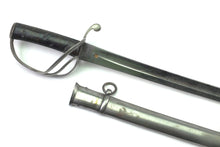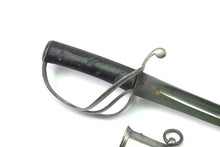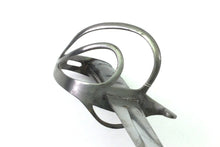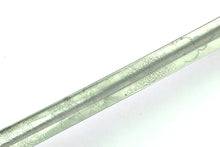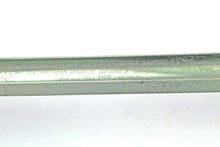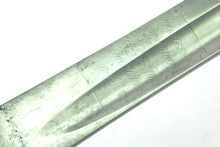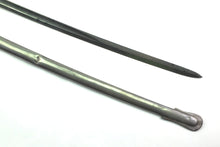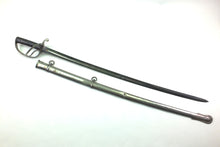
A Presentation 1853 Universal Pattern Cavalry Sword.
Missed out on this item? Click to view all current Antique Swords & Edged Weapons Free UK delivery on all items.
41” overall, 35” slightly curved spear pointed blade with broad fuller, etched ‘Presented by Captain Lord Leigh to Private Joshua Short 6th Troop W.Y.C. Being the 2nd Prize For Sword Exercise 1854’and ‘Reeves & Co Manufactures Toledo Works Charlotte Street Birm’ to one side, the other with Crown over VR in foliage and a Proof slug on Forte. Three bar iron guard, chequered leather grip. In its original iron scabbard with 2 suspension rings.
Circa 1853 Very good clear blade.
Hon W.H.Leigh Captain Warwickshire Regiment of Yeomanry Cavalry
William Henry Leigh succeeded his father as Baron Leigh on his death on 27 September 1850. He was Lord Lieutenant of Warwickshire from 1856 until his death and was also made a colonel in the 3rd Battalion of the local regiment, the Warwickshire Regiment. He was High Steward of Sutton Coldfield from 1859 until 1892, when the stewardship lapsed after a new charter was issued for the borough, but was reappointed in September 1902. He also held office as a Justice of the Peace for Gloucestershire. He donated the land for the construction of St Alban's Church, Holborn in central London. He was a Privy Councillor from 1895 onwards, the same year as he unsuccessfully stood as MP for the constituency of North Warwickshire in the general election that year. William was succeeded by his second son Francis, after his eldest son Gilbert's early death.
Lord Leigh was the first Grand Master of the Grand Lodge of Mark Master Masons, serving from 1856 to 1860. He was for more than 50 years (1852–1905) Provincial Grand Master for the Freemasons of Warwickshire.
The regiment was first formed as the Gentlemen and Yeomanry of Warwickshire in 1794, who raised four troops of yeomanry. These four troops were regimented in 1796 as the Warwickshire Regiment of Yeomanry Cavalry; the regiment expanded to a fifth troop in 1813, a sixth in 1831, and in 1854, with the Crimean War causing an upsurge in martial sentiment, two more troops were formed.








